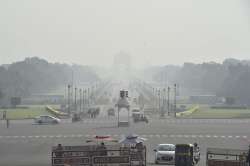Delhi chokes as air quality dips to 'very poor', government forms inspection team to check pollution
The air quality deteriorated days after, the pollution control board implemented an emergency plan to combat air pollution.

The air quality in Delhi for the first time deteriorated to 'very poor' category for the first time in the season on Wednesday. The overall Air Quality Index (AQI) of Delhi was recorded at 315. An AQI between 0 and 50 is considered 'good', 51 and 100 'satisfactory', 101 and 200 'moderate', 201 and 300 'poor', 301 and 400 'very poor' and 401 and 500 'severe'.
As per the Central Pollution Control Board (CPCB), the worst was recorded from Dwarka Sector-8, 376, followed by Anand Vihar at 358, Jahangirpuri 333, Rohini 330 and ITO at 295. According to news agency PTI, the air quality will deteriorate further as the forecast mentioned that in coming days the PM10 level will reach 341 and the PM2.5 level 159.
A CPCB official told the agency that a number of factors were responsible for the degrading air quality. This includes vehicular pollution, construction activities and meteorological factors- the drop and change of wind speed.
The air quality deteriorated days after, the pollution control board implemented an emergency plan to combat air pollution. Reportedly, an official said on-ground implementation of the Graded Response Action Plan (GRAP) directions was being enforced, but the activities causing pollution were still continuing and making the situation worse.
The emergency plan is generally implemented if "very poor" or "severe" air pollution levels are recorded for 48 hours or more. But given the extent of winter pollution witnessed by the national capital, the plan was implemented as the air quality slipped to the "poor" category, an official said.
Notably, the authorities have also deployed 41 inspection teams to monitor air pollution. However, reports on the inspections conducted by the CPCB till October 7, it was found that a total of 96 inspections were conducted during which 554 violations were recorded. Of these cases, 41 per cent violations were for open storage of construction and demolition of waste, 14 per cent for open waste dumping, 13 per cent for dust from unpaved roads, and 10 per cent for the open dumping of construction waste. This was followed by traffic congestion, road dust re-suspension, and open burning.
Meanwhile, state Environment Minister Imran Hussain on Thursday formed an inspection team to carry out surprise checks in the capital to check air pollution violations.
Hussain asserted that the inspections by the six-member committee will be carried out to check "ground level steps" being taken by various municipal and local bodies -- North and East Municipal corporation, Public Works Department (PWD) and Delhi Cantonment Board (DCB) - for prevention, control and mitigation of air pollution in Delhi.
"The Minister has also sought details and schedule of the operation of mechanical sweeping and sprinkling vehicles being operated by these bodies," a statement by Hussain's office said.
The six-member team comprises a representative of Deputy Commissioner (Revenue), Delhi Police, PWD, two representatives of MCD and New Delhi Municipal Council (NDMC), and a representative of Delhi Pollution Control Committee (DPCC) - area in-charge, not below the rank of Environmental Engineer.
The statement said, Member Secretary the Delhi Pollution Control Committee will accompany Hussain during surprise inspections.
Hussain has also directed development agencies to ensure that all construction sites adhere to the Construction and Demolition Waste Rules, 2016 to avoid any dust emission from construction activities.
"No Construction Material should be kept open and regular sprinkling of water at all construction sites must be done," Hussain instructed.
"All high-rise buildings should have the arrangement of water sprinkling for dust suppression. Strict action against the violators of norms should immediately be initiated by the respective authority," he added.
Hussain has further directed all the stakeholder departments to "intensify their actions as per the Graded Response Action Plan (GRAP)".
Meanwhile, Deputy Chief Minister Manish Sisodia appealed to the Central and the Union Environment Ministry to "immediately intervene and put an end to crop residue burning".
"Direct pro-active measures in other NCR states to bring down the factors contributing to air pollution," Sisodia said.
He slammed the neighbouring state governments -- Punjab, Haryana, Rajasthan and Uttar Pradesh -- for failing to provide subsidies to the farmers, which he said, ultimately led to rampant stubble burning.